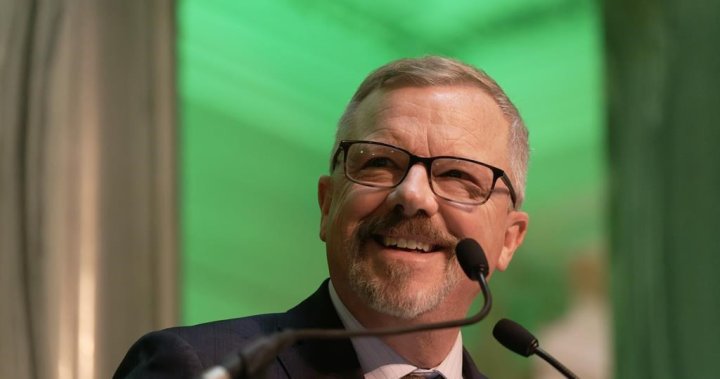Is it time for a “middle ground” on carbon reduction as the looming increase to the federal carbon price continues to stir growing concerns among both progressive and conservative political leaders?
Former Saskatchewan conservative premier Brad Wall says yes, and that any potential changes to how Canada tries to reduce carbon will need to weigh both what’s affordable for families and what technology can be used.
“If there’s a change at the federal level, a new government is going to have to look at the financial state of things. Look at the books, so to speak, of the country and determine what is affordable,” said Wall, who is a longtime opponent of the federal carbon price.
“I do think there’s a middle ground somewhere between a carbon tax that’s really not good for the economy and not very good for families in an inflationary environment, and an approach to technology that might take a price signal, but also has some market elements of it and some provincial-federal investment.”
As an alternative, Wall pointed to American legislation aimed at addressing climate change, which carries large costs but no economy-wide carbon price. This includes the Inflation Reduction Act, which includes several green measures and is expected to cost the American treasury $780 billion over 10 years.
The political fight over the carbon price has taken centre stage in the House of Commons over the past week — the last sitting week before the annual increase takes effect on April 1, as Conservative Leader Pierre Poilievre frames it as a major driver of cost-of-living challenges.
Since the plan for a federal pollution price was first announced in fall 2016, conservative-leaning politicians have opposed the measure, with the first major challenge starting with Wall.
“Our position was never that Canada shouldn’t be doing its share on the climate change front, that provinces shouldn’t be doing a share,” Wall told Global News in an interview from his home in Cypress Hills, Sask.
“We just thought a tax on 1.6 per cent of global emissions was inferior policy to a focus on technological investments that could help solve the problem globally.”
If the Conservatives form government after the next election, Poilievre has pledged to “axe the tax” and put an end to the Liberals’ signature climate measure.
Poilievre has not released a platform plank on how the party would address climate change but has said he sees the solution through technological measures like carbon capture and nuclear power.
And with Newfoundland and Labrador Premier Andrew Fury and Ontario Liberal Leader Bonnie Crombie also voicing concerns with the carbon price increase this week, the concerns even among Liberals raise questions about what an alternative could look like.

Wall has been a proponent of carbon capture and storage (CCS) as one alternative.
Breaking news from Canada and around the world
sent to your email, as it happens.
Breaking news from Canada and around the world
sent to your email, as it happens.
This still comes with a significant public price tag.
The Boundary Dam CCS facility opened in the province in October 2014, making it the first commercial facility of its kind in the world. At opening, it carried a $1.35-billion price tag, with $240 million coming from the federal government and $1.1 billion from the Saskatchewan government.
Since it became operational, the Boundary Dam CCS facility has captured nearly 5.8 million tonnes of carbon dioxide, according to Crown electrical utility SaskPower. But the plant has missed key targets and been hit by significant outages, and some environmental advocates have questioned the high costs of the project.
In the 2021 federal election, then-Conservative leader Erin O’Toole campaigned on removing the carbon price with an alternative plan. This would cap the fuel charge at $50 per tonne, as opposed to $170 per tonne in 20230 under the current Liberal policy.
O’Toole maintained this was “not a tax” because no money collected would go to the federal government, instead being syphoned to individual “carbon savings accounts,” which people could use to make green purchases.
Even for opponents of the Liberals like Wall, the pitch was confusing.
“O’Toole before (Poilievre) was going to replace it with some sort of an air miles-like program. I couldn’t even just explain it to people when they asked me during that election campaign,” he said.
Now, even progressive-leaning provincial politicians are wanting to at least see changes to the Liberal policy.
In addition to Furey, Ontario Liberal Leader Bonnie Crombie came out Tuesday saying that if elected her government will not use the federal carbon price. She said a policy is still being developed, but the mandate she gave her team is to be different than the federal backstop.
“We said, ‘Please evaluate all measures, all opportunities, look broadly, look abroad.’ What’s being done that we can adopt and emulate that won’t cost Ontario families that are already burdened, that can’t handle more taxation, but polluters are held accountable,” Crombie said Tuesday.
After being elected as Manitoba premier, Wab Kinew told The West Block that he wants to revisit the role of the federal carbon price in his province. Kinew cited the fact 95 per cent of Manitoba’s electricity comes from hydro power. Manitoba is one of three jurisdictions where the federal backstop applies to both heavy emitters and fuel.
The earliest this can take place is 2027, the next time the federal carbon price is up for its legislated review.
Clear ‘inflection point’ on carbon price ire, Wall says
On Tuesday, Environment and Climate Change Minister Steven Guilbeault said the increase cannot be paused because you can’t pause climate change.
Wall says he believes there’s been a change in attitude on the carbon price recently due in part to inflation putting a greater focus on affordability and credits Poilievre’s messaging on the subject.
But Wall attributes an announcement from Trudeau as the main inflection point – when he announced a three-year pause on the charge for home heating oil.
“I think that was an inflection point where Canadians said, ‘Wait a minute.’ If this is really about climate change and really about the environment, then how can you exclude this sort of very heavy-emitting source of energy and not do the same for others across the country?” Wall said.
“That seems more political than it does environmental, and I think it really has hurt the federal government on this.”
Most recent public opinion polls give the Conservatives a sizable lead over the Liberals in support.
With the Liberals, NDP and Bloc Québécois voting against Conservative carbon price-related motions over the past week, Wall says it would take a Tory majority to actually “axe the tax.”
“It’s looking good right now, but I remember from my time in politics there’s no lead that’s safe. And even if there is a lead in the polls, you want to make sure you’re working extra hard, like you’re 10 points behind,” Wall said.
Assuming the Liberal-NDP supply and confidence agreement holds, Canadians likely will not go to the polls until fall 2025. The latest an election can be held is Oct. 20, 2025.










